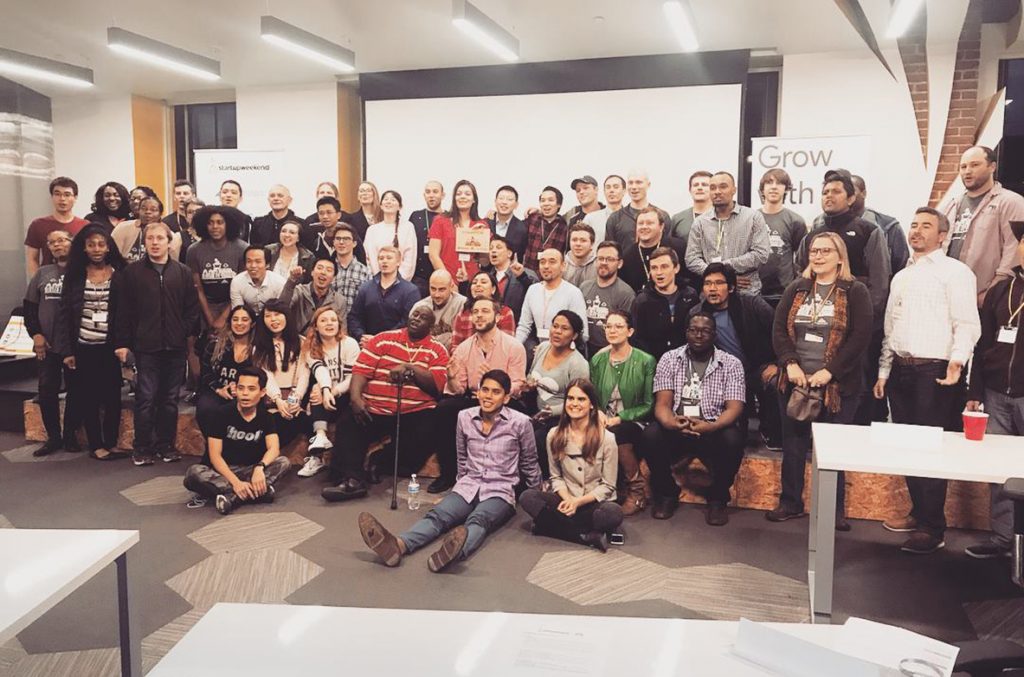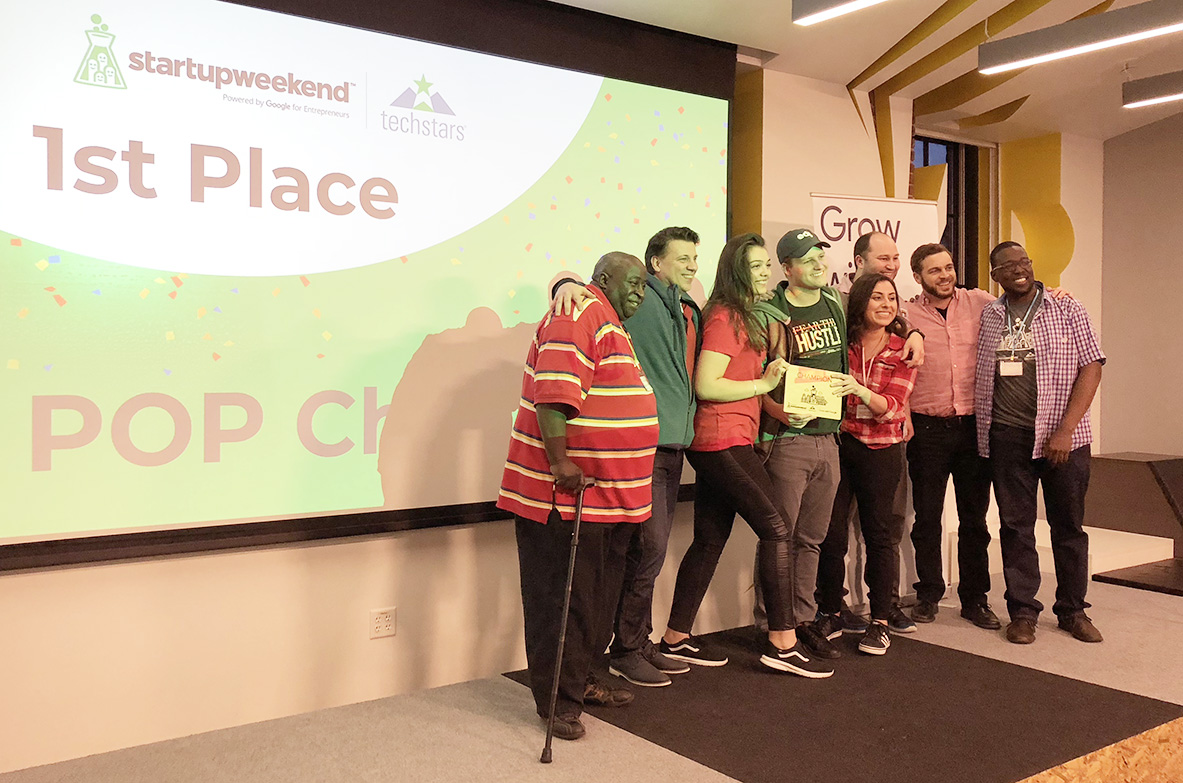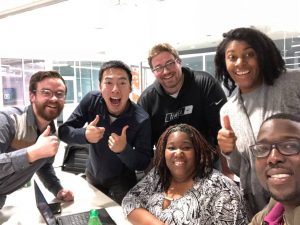Nine teams made it through Startup Weekend, but only one team earned the dough: PopChef, which cooked up a platform to sign up for interactive kitchen classes with local chefs.
PopChef co-founders Zack Kern and Ruby Montoya were ecstatic to win the competition, Kern said. In addition to receiving an hour of consulting with Lesa Mitchell, managing director of Techstars Kansas City, and Aldo Aguirre Gutiérrez, an entrepreneur and former regional director of Americas at Techstars, PopChef also won $3,000 of Google Cloud credit.
“This is my third Startup Weekend; third time’s the charm, I guess,” Kern said. “I am overwhelmed with joy.”
Montoya echoed Kern’s enthusiasm and appreciation PopChef received at Startup Weekend.
“I feel accomplished and inspired by being on the winning team for Startup Weekend,” Montoya said. “The idea for PopChef was pitched by Zach Kern, and everyone else hopped on board to make it happen. We all worked really hard to validate and move the concept forward to stay true to the market and the concept Zach originally pitched.”
Startup Weekend was a 54-hour event, Friday through Sunday at the Sprint Accelerator, during which participants formed teams that each developed a startup business. Those concepts were put to the test before judges, who evaluated each team’s concept based on three criteria: customer and market validation, execution and design, and the business model itself.
The team that developed Relay Logistics, a tech startup building a mobile app platform for truckers to provide real-time tracking logistics, took second place. Participants behind eJoust, a tech startup that offers a “different” gambling experience through an opaque payout structure and statistical analysis, were awarded third place. The second- and third-place winners also received an hour of consulting with Techstars.
The PopChef team is sticking together and members will discuss its plans moving forward with the business, Kern added.
“We’ve had a lot of collaborative effort and a great balance of skill sets this weekend to finally figure out how [we wanted] this model to work,” Kern said, telling to his teammates: “So I appreciate all your effort, and you were very instrumental in this coming together.”
The pain point PopChef identified: Consumers are frustrated or bored with their cooking because they lack the time and/or skills to cook healthy meals, Kern said. Customers also find going out to eat is often a mundane experience, and meal-delivering solutions have limitations. Through market research, the team also discovered that local chefs need more channels to demonstrate their cooking skills, Kern added.
“We have boots on the ground,” he said. “We went door to door, and we went to grocery stores, fitness clubs and things like that to validate what we have.”
PopChef’s unique proposition offers a community of on-demand chefs who provide their expertise and entertaining flare for everyday needs or special occasions, Kern said.
“We also have meal prep for those who don’t want to cook or have time, and dining classes for those who like to cook or prefer to be entertained,” he said.
Charging $35 a seat for each cooking class, PopChef plans to find chefs, create classes, fill seats, and advertise through word of mouth and on social media, Kern said. Anyone interested in taking a cooking class can sign up through PopChef’s website.
During the weekend competition alone, PopChef curated 10 participants for its first cooking class April 13, The PopChef Sushi Experience, Kern said.

Takeaways from the weekend
This year’s Startup Weekend partnered with Grow with Google and Techstars to play host to the event, said John Coler, lead organizer for Startup Weekend in Kansas City. The Startup Weekend organization includes a network of more than 3,500 mentors from 23 programs in 16 cities, according to organization data.
Zack Pennington, a representative from Startup Weekend who facilitated the Kansas City event, left the room of entrepreneurs with words of congratulations and encouragement.
“A lot of you are like, ‘Yeah, I can’t wait; I’m going to be rich tomorrow,’ and even though you’re 100-percent wrong, I really like your enthusiasm, so keep that up,” Pennington said, adding that a lot of teams from Startup Weekend don’t continue, but the point of the event is to provide entrepreneurs with connections and knowledge.
In fact, Startup Weekend data indicates 12 percent of teams move forward with building the business after the event, Pennington added.
“You’re going to fail, and that’s awesome,” Pennington said. “It’s OK; effort is everything, and learning from that effort is everything.”
Google gives unique Startup Weekend
Overall, this Startup Weekend in Kansas City went very well, with a lot of good ideas and learning opportunities for participants, said Troy Norris, a longtime Startup Weekend organizer.
“We had a few curve balls thrown at us with the different format with the Google partnership, but it created a lot of awesome opportunities also,” Norris said. “The community support, the volunteering of the judges and sponsors and the volunteers is great as always.”
Funding support by Grow with Google and Techstars allowed entrepreneurs to participate for free, which brought in a new wave of ideas, Norris added.
“We had a lot more first-timers than we would normally have,” Norris said. “If you do this long enough, you start to see a lot of the same things. This time was different. [There was] a lot of stuff I hadn’t seen presented before and a good array of consumer-focused and even deep real business infrastructure.”
Tina Peterson, a past volunteer for Startup Weekend who observed the pitches and judging, echoed Norris’s sentiment, adding that she saw more proof of customer validation emerge in the team presentations.
“It’s always fun to watch,” Peterson said. “It’s interesting what they come up with, and it’s amazing that they could get so much packed into really what ends up being just a few hours.”
Nine teams built business models around concepts for startup companies, including:
- PopChef
- Worm It
- Beauty Insider
- Eye 2 Eye Care Packs
- eJoust
- Relay Logistics
- Village Blocks
- Pozitiv
- Cyber Counsel
This year’s judges included: Jay Austin, co-founder of Eighty 80 Rule; Ari DeGrote, community and programs manager for Sprint Accelerator; Quest Moffat, founder of Project United Knowledge; Adrienne Haynes, founder of SEED Law; and Karen Fenaroli, founder of Fenaroli & Associates.








































